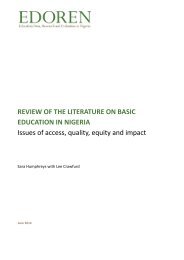review-of-the-literature-on-basic-education-in-nigeria-june-2014-3-1
review-of-the-literature-on-basic-education-in-nigeria-june-2014-3-1
review-of-the-literature-on-basic-education-in-nigeria-june-2014-3-1
You also want an ePaper? Increase the reach of your titles
YUMPU automatically turns print PDFs into web optimized ePapers that Google loves.
Review <str<strong>on</strong>g>of</str<strong>on</strong>g> <str<strong>on</strong>g>the</str<strong>on</strong>g> <str<strong>on</strong>g>literature</str<strong>on</strong>g> <strong>on</strong> <strong>basic</strong> educati<strong>on</strong> <strong>in</strong> NigeriaCHAPTER 5: OUTCOMES OF BASIC EDUCATION5.1 Introducti<strong>on</strong>This chapter <str<strong>on</strong>g>review</str<strong>on</strong>g>s <str<strong>on</strong>g>the</str<strong>on</strong>g> outcomes <str<strong>on</strong>g>of</str<strong>on</strong>g> <strong>basic</strong> educati<strong>on</strong>. It beg<strong>in</strong>s by look<strong>in</strong>g at <str<strong>on</strong>g>the</str<strong>on</strong>g> effectiveness <str<strong>on</strong>g>of</str<strong>on</strong>g>educati<strong>on</strong>, <strong>in</strong> particular <str<strong>on</strong>g>the</str<strong>on</strong>g> impact <str<strong>on</strong>g>of</str<strong>on</strong>g> school<strong>in</strong>g <strong>on</strong> actual learn<strong>in</strong>g outcomes, focus<strong>in</strong>g <strong>on</strong> literacy andnumeracy. It <str<strong>on</strong>g>the</str<strong>on</strong>g>n c<strong>on</strong>siders a set <str<strong>on</strong>g>of</str<strong>on</strong>g> expected outcomes <str<strong>on</strong>g>of</str<strong>on</strong>g> educati<strong>on</strong> that have been established <strong>in</strong>o<str<strong>on</strong>g>the</str<strong>on</strong>g>r c<strong>on</strong>texts, before subsequently <str<strong>on</strong>g>review</str<strong>on</strong>g><strong>in</strong>g <str<strong>on</strong>g>the</str<strong>on</strong>g> evidence from Nigeria. We c<strong>on</strong>sider both f<strong>in</strong>ancialand n<strong>on</strong>-f<strong>in</strong>ancial ga<strong>in</strong>s, <strong>in</strong>clud<strong>in</strong>g <str<strong>on</strong>g>the</str<strong>on</strong>g> social benefits.Overall, <str<strong>on</strong>g>the</str<strong>on</strong>g> evidence base <strong>on</strong> <str<strong>on</strong>g>the</str<strong>on</strong>g> outcomes <str<strong>on</strong>g>of</str<strong>on</strong>g> <strong>basic</strong> educati<strong>on</strong> <strong>in</strong> Nigeria is relatively weak. There is no<strong>in</strong>stituti<strong>on</strong>alised system for <str<strong>on</strong>g>the</str<strong>on</strong>g> regular measurement <str<strong>on</strong>g>of</str<strong>on</strong>g> learn<strong>in</strong>g outcomes. Measures that do existsuggest very low learn<strong>in</strong>g levels, e.g. nearly half (46%) <str<strong>on</strong>g>of</str<strong>on</strong>g> children who have completed primary schoolare not able to read a complete sentence (NPC & RTI Internati<strong>on</strong>al 2011).There is <strong>in</strong> some sense a c<strong>on</strong>tradicti<strong>on</strong> between <str<strong>on</strong>g>the</str<strong>on</strong>g> evidence <strong>on</strong> very poor learn<strong>in</strong>g outcomes fromschool<strong>in</strong>g and <str<strong>on</strong>g>the</str<strong>on</strong>g> evidence that suggests that school<strong>in</strong>g has positive impacts <strong>on</strong> o<str<strong>on</strong>g>the</str<strong>on</strong>g>r outcomes such as<strong>on</strong> labour market performance and health.In regard to <str<strong>on</strong>g>the</str<strong>on</strong>g> labour market, <strong>in</strong>creased earn<strong>in</strong>gs come mostly from sec<strong>on</strong>dary and tertiary school<strong>in</strong>g,which can provide access to government and formal sector jobs. School<strong>in</strong>g at primary level may have amuch smaller impact <strong>on</strong> <strong>in</strong>dividual productivity and wages. Educati<strong>on</strong> may also functi<strong>on</strong> as a signal <str<strong>on</strong>g>of</str<strong>on</strong>g>ability, which can help <strong>in</strong>dividuals get jobs and earn more without <strong>in</strong>creas<strong>in</strong>g <str<strong>on</strong>g>the</str<strong>on</strong>g>ir underly<strong>in</strong>gproductivity.In regard to health, it may be that <str<strong>on</strong>g>the</str<strong>on</strong>g>re is o<str<strong>on</strong>g>the</str<strong>on</strong>g>r learn<strong>in</strong>g go<strong>in</strong>g <strong>on</strong> <strong>in</strong> schools that is not captured bytests <str<strong>on</strong>g>of</str<strong>on</strong>g> specific skills such as literacy and numeracy, and that this has a positive impact <strong>on</strong> healthoutcomes (although this is speculative). Likewise, for girls, it may be possible that simply rema<strong>in</strong><strong>in</strong>g <strong>in</strong>school through sec<strong>on</strong>dary school can reduce <str<strong>on</strong>g>the</str<strong>on</strong>g> chances <str<strong>on</strong>g>of</str<strong>on</strong>g> early marriage and delay pregnancy.5.2 Perceived impact <str<strong>on</strong>g>of</str<strong>on</strong>g> school<strong>in</strong>gThe 2010 NEDS asks parents about <str<strong>on</strong>g>the</str<strong>on</strong>g> perceived value to children <str<strong>on</strong>g>of</str<strong>on</strong>g> complet<strong>in</strong>g primary school<strong>in</strong>g.Over 97% <str<strong>on</strong>g>of</str<strong>on</strong>g> parents th<strong>in</strong>k that school<strong>in</strong>g is beneficial for both boys and girls. Comm<strong>on</strong> benefits cited<strong>in</strong>clude literacy (48–49%), <str<strong>on</strong>g>the</str<strong>on</strong>g> chance to go to sec<strong>on</strong>dary school (26–27%), morals and values (19–20%),and critical th<strong>in</strong>k<strong>in</strong>g (15–16%). The chance <str<strong>on</strong>g>of</str<strong>on</strong>g> f<strong>in</strong>d<strong>in</strong>g a better job was cited by 13–14% <str<strong>on</strong>g>of</str<strong>on</strong>g> parents. Themajority <str<strong>on</strong>g>of</str<strong>on</strong>g> parents reported no disadvantages <str<strong>on</strong>g>of</str<strong>on</strong>g> primary school completi<strong>on</strong> for girls and boys, with <str<strong>on</strong>g>the</str<strong>on</strong>g>excepti<strong>on</strong> <str<strong>on</strong>g>of</str<strong>on</strong>g> <str<strong>on</strong>g>the</str<strong>on</strong>g> North East and North West regi<strong>on</strong>s, <strong>in</strong> which less than half <str<strong>on</strong>g>of</str<strong>on</strong>g> parents reported that<str<strong>on</strong>g>the</str<strong>on</strong>g>re were no disadvantages from school<strong>in</strong>g (NPC and RTI Internati<strong>on</strong>al 2011).5.3 The impact <str<strong>on</strong>g>of</str<strong>on</strong>g> school<strong>in</strong>g <strong>on</strong> learn<strong>in</strong>g outcomesAt present <str<strong>on</strong>g>the</str<strong>on</strong>g>re is no <strong>in</strong>stituti<strong>on</strong>alised nati<strong>on</strong>al system for <str<strong>on</strong>g>the</str<strong>on</strong>g> regular measurement <str<strong>on</strong>g>of</str<strong>on</strong>g> learn<strong>in</strong>goutcomes (ESSPIN 2009a), and nati<strong>on</strong>al school exam<strong>in</strong>ati<strong>on</strong>s are not taken until <str<strong>on</strong>g>the</str<strong>on</strong>g> end <str<strong>on</strong>g>of</str<strong>on</strong>g> seniorsec<strong>on</strong>dary school (see Secti<strong>on</strong> 4.5 for discussi<strong>on</strong> <str<strong>on</strong>g>of</str<strong>on</strong>g> primary school and JSS assessments). What follows isevidence ga<str<strong>on</strong>g>the</str<strong>on</strong>g>red from <str<strong>on</strong>g>the</str<strong>on</strong>g> very <strong>basic</strong> assessments <str<strong>on</strong>g>of</str<strong>on</strong>g> literacy and numeracy from household surveydata and more sophisticated assessments made <strong>in</strong> a selecti<strong>on</strong> <str<strong>on</strong>g>of</str<strong>on</strong>g> states supported by ESSPIN and <str<strong>on</strong>g>the</str<strong>on</strong>g>Nor<str<strong>on</strong>g>the</str<strong>on</strong>g>rn Educati<strong>on</strong> Initiative (NEI).EDOREN – Educati<strong>on</strong> Data, Research and Evaluati<strong>on</strong> <strong>in</strong> Nigeria 48



